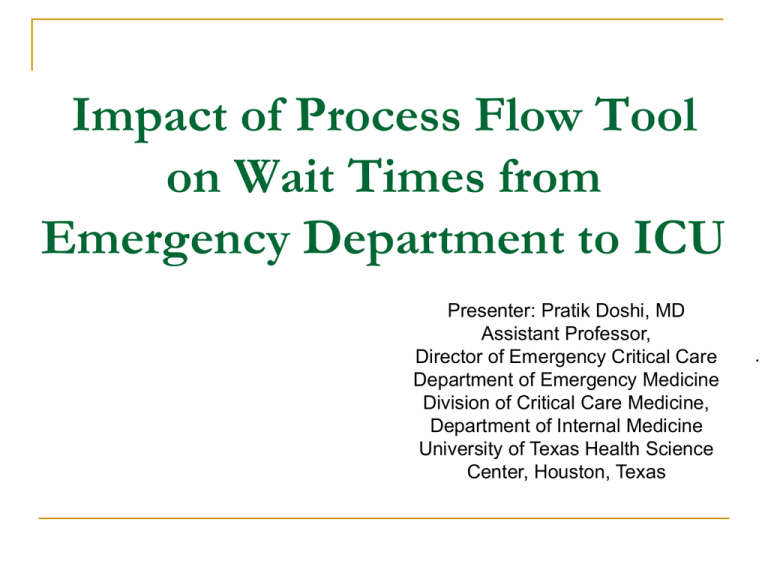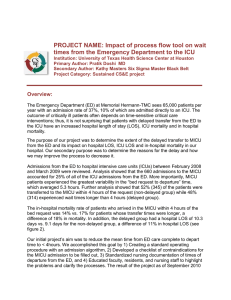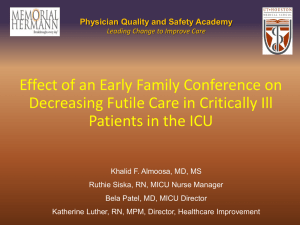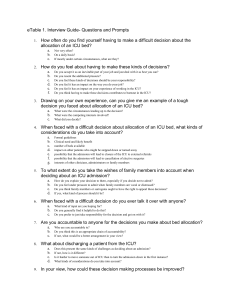Impact process flow tool on wait times ed-to-icu
advertisement

Impact of Process Flow Tool
on Wait Times from
Emergency Department to ICU
Presenter: Pratik Doshi, MD
Assistant Professor,
Director of Emergency Critical Care
Department of Emergency Medicine
Division of Critical Care Medicine,
Department of Internal Medicine
University of Texas Health Science
Center, Houston, Texas
.
Conflict of interest
None
Overview
● 65,000 Emergency Department visits per year
▪ 37% admitted to hospital
▪ 10% of admitted patients admitted to ICU
● Delayed ICU transfer (>4 hours from care
complete to ICU arrival)
▪ Increased hospital mortality
▪ Increased hospital LOS
▪ Increased ICU LOS
Chalfin et al. Impact of delayed transfer of critically ill patients from the emergency
department to the intensive care unit. Crit care med 2007; 35: 1477-83.
Overview
Mean Time to Admit by Unit
Baseline Mar 2008 to Feb 2009
Admits
Mean Time
1000
6:00
Annual admits per Unit
800
4:48
4:18
700
3:39
600
3:36
500
2:35
400
2:28
2:19
2:24
300
200
100
1:12
890
660
598
512
53
CCU
CVICU
32
0
0:00
NTIC / NCCU
MICU
STIC
TSIC
Mean by unit --hours: min
5:32
900
Baseline Data
March 08- February 09
Care Complete to Depart MICU Admits
<4 hours
>4 hours
345
314
% of total patients
52%
48%
Mortalty Rate
14%
17%
Hospital LOS
9.10
10.30
CMI
2.33
2.60
Age
55
58
% Male
52%
48%
% Female
48%
52%
30 day readmits
40
32
30 day readmits-- Same DRG
12
7
Patients
Mortality
18% higher
Length of stay
11% higher
Overview
Largest Variation : Care complete to departure
Overview
Overview
Methods
Prospective case Controlled Trial from 2/20089/2010
In Phase 1:Compare the outcomes of medical ICU
admissions between those with ED to ICU wait
times < 4 hours with those > 4 hours
In phase2: compare similar outcomes after
introducing a qualifying admissions tool designed to
reduce wait times to admission
An admission pre-qualifying checklist, standardized
nurse documentation, and accelerated bed
management process redesign was introduced
Actions
Creation of standard operating procedure with an
admission algorithm
Checklist of contraindications for MICU admission to
be filled out on all patients admitted to MICU by EM
faculty
Standardization of nursing documentation of times
of departure
Defect log in MICU
Educated Faculty, residents, and nursing staff to
highlight problems and clarify processes
Flow chart for MICU
admission
Contraindications to MICU Admission
1) Does the patient have an ICH/CVA?
Yes □
No □
2) Does the patient have extensive
burns or Stevens-Johnson syndrome
(BSA > 15%, 2nd and 3rd degree)
{Please examine the patient’s entire
body}
Yes □
No □
3) Does the patient have severe Heart Failure
potentially requiring Intra-aortic balloon
pump(IABP)
Yes □
No □
4) Is the patient s/p Cardiac Arrest
requiring therapeutic hypothermia
Yes □
No □
5) Has the patient been evaluated by
another service for ICU admission and
rejected for admission?
Yes □
No □
Results
Mean time from Emergency room care complete to MICU admission
decreased by 2.04 hours(37 %), from 5.53 hours to 3.49 hours
Results
Mean time for Emergency department arrival to departure decreased by
1.98 hours(22%) from 8.81 hours to 6.83 hours.
Results
CC to Depar
Baseline Feb
08-Mar 09
Sept 09-Apr
10
Total
Change
CC to Depart
xx.xx hrs
5.53 (±5.16)
3.49(±3.49)
CC to Depart
hh:mm
5:32 (+5:10)
3:29 (+3.29)
CC to Depart
min
332
209
123
CC to Depart
<4 hrs
346 (52%)
474 (74%)
22%
CC to Depart
>4 hrs
314 (48%)
169 (26%)
PValue
0.0001
37%
Results
Feb 08 to
Mar 09
(Baseline)
Sept 09- Apr
10
Total
660
643
Arrival to
Depart
8.81 (± 5.77)
6.83 (±4.20)
xx.xx hrs
Arrival to
Depart
mean
(hh:mm)
8 hrs 49 min
6 hrs 50min
Arrival to
Depart
SD (hh:mm)
5 hrs 46 min
4 hrs 12 min
Arrival to
Depart
min
529
410
Total Δ
%Δ
p value
0.0001
1 hr 59
min
-22%
119
-22%
Results
Mean time Arrival to Depart vs Care Complete to Depart
Arriv to Dep
10:48
9:36
Mean time hh:mm
8:24
7:12
6:00
4:48
3:36
2:24
1:12
0:00
CC to Dep
Results
Before
After
MICU
bed Avail
9 hrs 21 min
6 hrs 34 min
0.0001
MICU
bed not Avail
7 hrs 45 min
8 hrs 43 min
0.2352
Percent of Patients
Transferred < 4 Hours
Baseline
Intervention
p-Value
Percent of Patients Transferred
< 4 Hours
Baseline
Intervention
62%
80%
50%
49%
No Bed
Bed
Results
Results
Before
After
Length of
stay
mean days
9.67
8.13
Length of
stay
SD
(+11.33)
(+7.25)
Mortality
Rate
15%
15%
DRG wt
(CMI)
2.45 (+2.68)
2.38 (+2.37)
Age
Mean
56.4
55.7
Age
SD
(+18.4)
(+18.6)
Total Δ
%Δ
1.54
-16%
p-Value
0.0035
0.5836
Conclusions
Boarding of critically ill patients in the
Emergency department has an association
with worse outcomes
Emergency room based process flow tool can
be effective in reducing the wait times for
patients admitted to the ICU
This decrease in boarding times seems to be
associated with decreased hospital length of
stay
Conclusions
Mortality rates remained stable
More patients in the lower mortality and LOS
group translates into potential lives saved
and definite hospital days saved
The hospital days saved total a potential of
990 days, at a rate of 1.54 days for the 643
admissions after the process was instituted,
which results in a conservative estimate of
$1,039,500 of cost avoidance over the year.
Key Learning
No Magic Bullet
Walk the process
Solution should be the result of process, not
pre-conceived
Solution may just be “leaning” the process
Team Members
Brent King, MD: Chair, Department of Emergency Medicine
James McCarthy, MD: Medical Director, Department of Emergency
Medicine
Bela Patel, MD: Medical Director, Medical ICU
Yashwant Chathampally, MD: Department of Emergency Medicine
Ruth Siska, RN and Tammy Campos, MSN: Medical ICU
Sylvia Reimer, RN and Janice Hughes, RN: Emergency Department
Katharine Luther
Questions?


